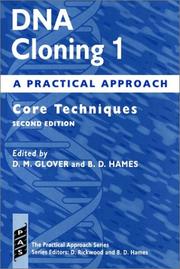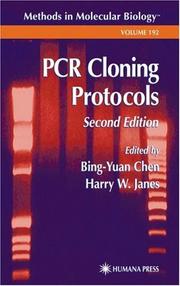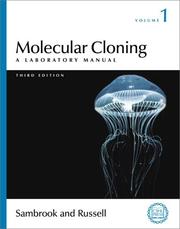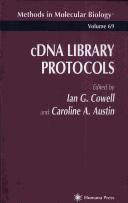| Listing 1 - 6 of 6 |
Sort by
|
Book
ISBN: 0632019271 9780632019274 Year: 1987 Publisher: Oxford Blackwell
Abstract | Keywords | Export | Availability | Bookmark
 Loading...
Loading...Choose an application
- Reference Manager
- EndNote
- RefWorks (Direct export to RefWorks)
Biological techniques --- Molecular biology --- Biotechnology --- Cloning, Molecular --- methods --- Molecular cloning --- Laboratory manuals --- methods. --- Molecular cloning - Laboratory manuals --- Cloning, Molecular - laboratory manuals

ISBN: 0199634769 0199634777 0199634793 0199634785 0199634823 0199634807 0199634831 9780199634781 Year: 1995 Volume: 149 Publisher: Oxford Oxford University Press
Abstract | Keywords | Export | Availability | Bookmark
 Loading...
Loading...Choose an application
- Reference Manager
- EndNote
- RefWorks (Direct export to RefWorks)
This volume provides detailed laboratory protocols, advice, hints and tips, example data, key literature citations, background information, and troubleshooting comments for the steps used in most molecular biology laboratories for example transformation, construction of cDNA and genomic libraries, probe preparation, analysis of gene organization and expression, in vitro mutagenesis, and DNA sequencing. The information provided is an completely up-to-date account of each topic by established researchers. These two books, the first of four volumes are thoroughly revised and up-dated versions of the original ones published in the Practical Approach series. Together they will offer a complete guide to the major techniques required by modern molecular biology laboratories.
Biological techniques --- Biochemical engineering --- Molecular biology --- Molecular cloning --- Recombinant DNA --- Laboratory manuals. --- Cloning, Molecular --- DNA, Recombinant --- Clonage moléculaire --- laboratory manuals. --- Laboratory manuals --- Manuels de laboratoire --- Molecular cloning - Laboratory manuals. --- Recombinant DNA - Laboratory manuals.
Book
ISBN: 9781936113422 9781936113415 1936113414 1936113422 Year: 2012 Publisher: Cold Spring Harbor, N.Y. Cold Spring Harbor Laboratory Press
Abstract | Keywords | Export | Availability | Bookmark
 Loading...
Loading...Choose an application
- Reference Manager
- EndNote
- RefWorks (Direct export to RefWorks)
Molecular Cloning has served as the foundation of technical expertise in labs worldwide for 30 years. No other manual has been so popular, or so influential. ... The theoretical and historical underpinnings of techniques are prominent features of the presentation throughout, information that does much to help trouble-shoot experimental problems. For the fourth edition of this classic work, the content has been entirely recast to include nucleic-acid based methods selected as the most widely used and valuable in molecular and cellular biology laboratories. Core chapters from the third edition have been revised to feature current strategies and approaches to the preparation and cloning of nucleic acids, gene transfer, and expression analysis. They are augmented by 12 new chapters which show how DNA, RNA, and proteins should be prepared, evaluated, and manipulated, and how data generation and analysis can be handled. The new content includes methods for studying interactions between cellular components, such as microarrays, next-generation sequencing technologies, RNA interference, and epigenetic analysis using DNA methylation techniques and chromatin immunoprecipitation. To make sense of the wealth of data produced by these techniques, a bioinformatics chapter describes the use of analytical tools for comparing sequences of genes and proteins and identifying common expression patterns among sets of genes. Building on thirty years of trust, reliability, and authority, the fourth edition of Molecular Cloning is the new gold standard--the one indispensable molecular biology laboratory manual and reference source. --Publisher description.
polymers --- DNA (deoxyribonucleic acid) --- moleculaire biologie --- genetische manipulatie --- klonen --- Molecular biology --- Chemical laboratory practice --- polymeren --- Macromolecules --- Molecular cloning --- Cloning, Molecular --- Clonage moléculaire --- Laboratory manuals. --- Manuels de laboratoire --- ADN --- DNA --- molecular cloning --- genes --- technique de laboratoire --- laboratory techniques --- Vecteur génétique --- Genetic vectors --- Plasmide --- plasmids --- PCR --- Bioinformatique --- Bioinformatics --- Transfection --- transfection --- Expression des gènes --- gene expression --- Interaction génique --- gene interaction --- Cloning, Molecular. --- Molecular Cloning --- Cosmids --- Cloning, Organism --- DNA cloning --- Gene cloning --- Cloning --- Genetic engineering --- Molecular genetics --- Clone cells --- 542 --- clonen --- laboratoriumtechnieken --- groene chemie --- Clonage moléculaire --- Klonen --- Moleculaire genetica --- Genetische manipulatie --- DNA. --- transfection. --- bio-informatica --- mutageniteit --- oligonucleotides --- microarrays --- gisten --- Monograph --- Molecular cloning - Laboratory manuals

ISBN: 0896039692 0896039730 0585403341 1280821396 9786610821396 1592591779 Year: 2002 Volume: 192 Publisher: Totowa, NJ : Humana Press : Imprint: Humana,
Abstract | Keywords | Export | Availability | Bookmark
 Loading...
Loading...Choose an application
- Reference Manager
- EndNote
- RefWorks (Direct export to RefWorks)
In the post-genomic era, PCR has become the method of choice not only for cloning existing genes, but also for generating a wide array of novel genes by mutagenesis and/or recombination within the genes of interest. PCR Cloning Protocols, Second Edition, updates and expands Bruce White's best-selling PCR Cloning Protocols (1997) with the newest procedures for DNA cloning and mutagenesis. Here the researcher will find readily reproducible methods for all the major aspects of PCR use, including PCR optimization, computer programs for PCR primer design and analysis, and novel variations for cloning genes of special characteristics or origin, with emphasis on long-distance PCR and GC-rich template amplification. Also included are both conventional and novel enzyme-free and restriction site-free procedures to clone PCR products into a range of vectors, as well as state-of-the-art protocols to facilitate DNA mutagenesis and recombination and to clone the challenging uncharacterized DNA flanking a known DNA fragment. Powerful applications of PCR in library construction and sublibrary generation and screening are also presented. Authoritative and up-to-date, PCR Cloning Protocols, Second Edition, constitutes a gold-standard collection of the fastest, simplest, and most popular methods for isolating genes from all biological samples and creating novel genes from them by mutagenesis/recombination-essential methods for today's study of functional genomics, gene expression, protein structure-function relationships, protein engineering, and molecular evolution.
Molecular cloning --- Polymerase chain reaction --- Clonage moléculaire --- Réaction en chaîne de la polymérase --- Laboratory manuals --- Manuels de laboratoire --- Electronic books. -- local. --- Molecular cloning -- Laboratory manuals. --- Polymerase chain reaction -- Laboratory manuals. --- Genetics --- Biology --- Health & Biological Sciences --- Clonage moléculaire --- Réaction en chaîne de la polymérase --- Life sciences. --- Science. --- Biochemistry. --- Cell biology. --- Life Sciences. --- Biochemistry, general. --- Cell Biology. --- Science, general. --- Cell biology --- Cellular biology --- Cells --- Cytologists --- Biological chemistry --- Chemical composition of organisms --- Organisms --- Physiological chemistry --- Chemistry --- Medical sciences --- Natural science --- Science of science --- Sciences --- Biosciences --- Sciences, Life --- Science --- Composition --- Cloning, Molecular --- DNA cloning --- Gene cloning --- Cloning --- Genetic engineering --- Molecular genetics --- Clone cells --- Science, Humanities and Social Sciences, multidisciplinary. --- Cytology.

ISBN: 0879695773 0879695765 9780879695774 9780879695767 Year: 2001 Publisher: Cold Spring Harbor : Cold Spring Harbor Laboratory Press,
Abstract | Keywords | Export | Availability | Bookmark
 Loading...
Loading...Choose an application
- Reference Manager
- EndNote
- RefWorks (Direct export to RefWorks)
Chemical laboratory practice --- Molecular biology --- genetische manipulatie --- DNA (deoxyribonucleic acid) --- klonen --- moleculaire biologie --- Molecular cloning --- Cloning, Molecular --- Basic Sciences. Biology --- Basic Sciences. Molecular Biology --- Cellular Biology. --- Genetic Engineering. --- molecular cloning --- plasmids --- Bacteriophages --- Electrophoresis --- DNA. --- DNA --- eukaryotic cells --- PCR --- In vitro culture --- RNA. --- RNA --- Sampling --- Tracer techniques --- Nucleotides --- Gene pools --- genes --- identification. --- identification --- genetic engineering --- Mutagens --- gene expression --- Escherichia coli --- cloning --- Transgenic animals --- proteins --- technology --- Biotechnologie --- Klonen --- 57.08 --- 577.2 --- 57.08 Biological techniques. Experimental methods. Equipment --- Biological techniques. Experimental methods. Equipment --- 577.2 Molecular bases of life. Molecular biology --- Molecular bases of life. Molecular biology --- Molecular Cloning --- Cosmids --- Cloning, Organism --- DNA cloning --- Gene cloning --- Cloning --- Genetic engineering --- Molecular genetics --- Clone cells --- Moleculaire genetica --- Clonage moléculaire --- Laboratory Manuals. --- Laboratory manuals. --- Manuels de laboratoire --- Molecular cloning - Laboratory manuals --- Cloning, Molecular - laboratory manuals --- Cloning, molecular --- Electrophoresis, agar gel --- Gene library --- Plasmids --- Rna, messenger

ISBN: 089603383X 9786610836765 1280836768 1592595553 Year: 1997 Volume: 69 Publisher: Totowa, NJ : Humana Press : Imprint: Humana,
Abstract | Keywords | Export | Availability | Bookmark
 Loading...
Loading...Choose an application
- Reference Manager
- EndNote
- RefWorks (Direct export to RefWorks)
The first libraries of complementary DNA (cDNA) clones were con structed in the mid-to-late 1970s using RNA-dependent DNA polymerase (reverse transcriptase) to convert poly A* mRNA into double-stranded cDNA suitable for insertion into prokaryotic vectors. Since then cDNA technology has become a fundamental tool for the molecular biologist and at the same time some very significant advances have occurred in the methods for con structing and screening cDNA libraries. It is not the aim of cDNA Library Protocols to give a comprehensive review of all cDNA library-based methodologies; instead we present a series of up-to-date protocols that together should give a good grounding of proce dures associated with the construction and use of cDNA libraries. In deciding what to include, we endeavored to combine up-to-date versions of some of the most widely used protocols with some very usefiil newer techniques. cDNA Library Protocols should therefore be especially useful to the investigator who is new to the use of cDNA libraries, but should also be of value to the more experienced worker. Chapters 1—5 concentrate on cDNA library construction and manipula tion, Chapters 6 and 7 describe means of cloning difficult-to-obtain ends of cDNAs, Chapters 8-18 give various approaches to the screening of cDNA libraries, and the remaining chapters present methods of analysis of cDNA clones including details of how to analyze cDNA sequence data and how to make use of the wealth of cDNA data emerging from the human genome project.
DNA, Complementary --- Gene Library --- Genetic Techniques --- Antisense DNA --- DNA --- Gene libraries --- Molecular cloning --- ADN --- Clonage moléculaire --- Laboratory manuals --- Manuels de laboratoire --- 57.088 --- 577.212.3 --- -DNA --- -Gene libraries --- -Molecular cloning --- -#ABIB:aimm --- Cloning, Molecular --- DNA cloning --- Gene cloning --- Cloning --- Genetic engineering --- Molecular genetics --- Clone cells --- Gene banks (Genetic engineering) --- Genomic banks --- Genomic libraries --- Biological resource centers --- Genomes --- Recombinant DNA --- Deoxyribonucleic acid --- Desoxyribonucleic acid --- Thymonucleic acid --- TNA (Nucleic acid) --- Deoxyribose --- Nucleic acids --- Genes --- Complementary DNA --- Antisense nucleic acids --- Special methods and techniques for studing biological molecules. Separation. Centrifuging. X-ray study. Radioisotope methods --- Nucleic acid base and sequence compositon. Experimental deciphering of genetic code. --- Antisense DNA -- Laboratory manuals. --- DNA -- Laboratory manuals. --- Electronic books. -- local. --- Gene libraries -- Laboratory manuals. --- Molecular cloning -- Laboratory manuals. --- DNA, Single-Stranded --- DNA Probes --- Genetic Structures --- Investigative Techniques --- Nucleic Acid Probes --- Analytical, Diagnostic and Therapeutic Techniques and Equipment --- Genetic Phenomena --- Nucleic Acids --- Phenomena and Processes --- Molecular Probes --- Laboratory Chemicals --- Nucleic Acids, Nucleotides, and Nucleosides --- Chemicals and Drugs --- Specialty Uses of Chemicals --- Chemical Actions and Uses --- Genetics --- Biology --- Health & Biological Sciences --- DNA, Complementary. --- Gene Library. --- Genetic Techniques. --- Laboratory manuals. --- 577.212.3 Nucleic acid base and sequence compositon. Experimental deciphering of genetic code. --- 57.088 Special methods and techniques for studing biological molecules. Separation. Centrifuging. X-ray study. Radioisotope methods --- Antisense dna --- Dna --- Dna, complementary. --- Gene library. --- Genetic techniques. --- Clonage moléculaire --- #ABIB:aimm --- Nucleic acid base and sequence compositon. Experimental deciphering of genetic code --- Cytology. --- Immunology. --- Cell Biology. --- Immunobiology --- Life sciences --- Serology --- Cell biology --- Cellular biology --- Cells --- Cytologists
| Listing 1 - 6 of 6 |
Sort by
|

 Search
Search Feedback
Feedback About UniCat
About UniCat  Help
Help News
News